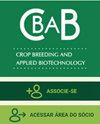IAC 2051:种皮变黑缓慢的carioca型普通豆品种
IF 1.1
4区 农林科学
Q2 Agricultural and Biological Sciences
引用次数: 1
摘要
IAC 2051是菜豆(Phaseolus vulgaris L.)品种,种皮为木薯型,平均1000粒重300g,半直立型II型生长不确定,收获后种皮变黑慢,抗枯萎病、普通青枯病和三种炭疽病,平均产量2729 kg ha-1。本文章由计算机程序翻译,如有差异,请以英文原文为准。
IAC 2051: common bean cultivar of carioca type with slow seed coat darkening
IAC 2051 is a common bean (Phaseolus vulgaris L.) cultivar with carioca-type seed coat, mean 1000 seed weight of 300g, indeterminate semiupright type II growth habit, slow post-harvest seed coat darkening, resistance to Fusarium wilt, common bacterial blight, and three races of anthracnose, and mean yield of 2729 kg ha-1.
求助全文
通过发布文献求助,成功后即可免费获取论文全文。
去求助
来源期刊
CiteScore
2.40
自引率
13.30%
发文量
25
审稿时长
6-12 weeks
期刊介绍:
The CBAB – CROP BREEDING AND APPLIED BIOTECHNOLOGY (ISSN 1984-7033) – is the official quarterly journal of the Brazilian Society of Plant Breeding, abbreviated CROP BREED APPL BIOTECHNOL.
It publishes original scientific articles, which contribute to the scientific and technological development of plant breeding and agriculture. Articles should be to do with basic and applied research on improvement of perennial and annual plants, within the fields of genetics, conservation of germplasm, biotechnology, genomics, cytogenetics, experimental statistics, seeds, food quality, biotic and abiotic stress, and correlated areas. The article must be unpublished. Simultaneous submitting to another periodical is ruled out. Authors are held solely responsible for the opinions and ideas expressed, which do not necessarily reflect the view of the Editorial board. However, the Editorial board reserves the right to suggest or ask for any modifications required. The journal adopts the Ithenticate software for identification of plagiarism. Complete or partial reproduction of articles is permitted, provided the source is cited. All content of the journal, except where identified, is licensed under a Creative Commons attribution-type BY. All articles are published free of charge. This is an open access journal.

 求助内容:
求助内容: 应助结果提醒方式:
应助结果提醒方式:


